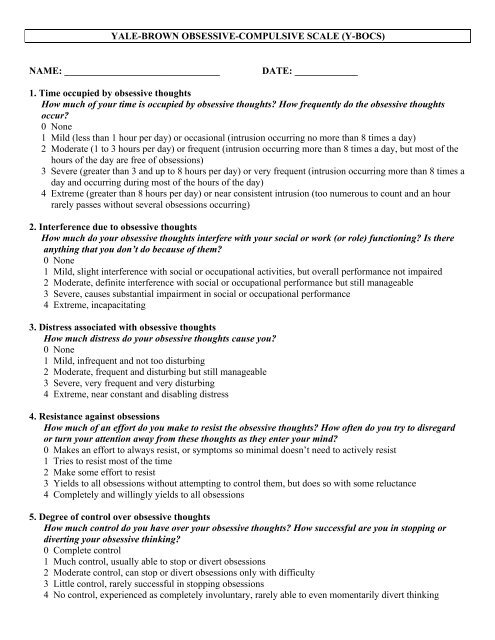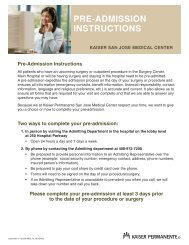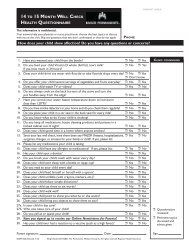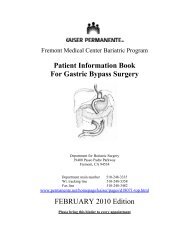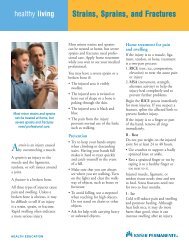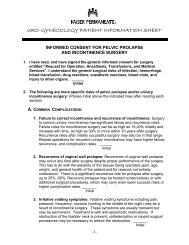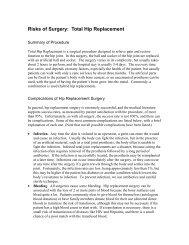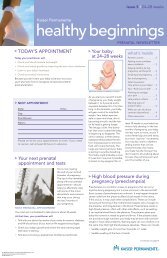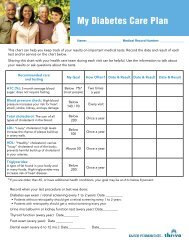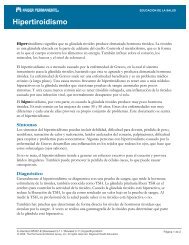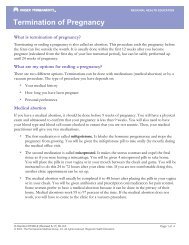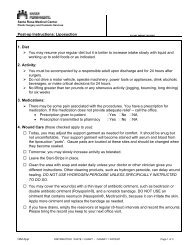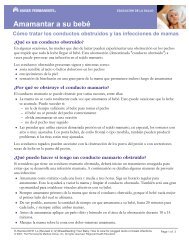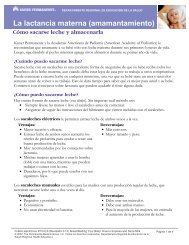Y-BOCS - permanente.net
Y-BOCS - permanente.net
Y-BOCS - permanente.net
Create successful ePaper yourself
Turn your PDF publications into a flip-book with our unique Google optimized e-Paper software.
YALE-BROWN OBSESSIVE-COMPULSIVE SCALE (Y-<strong>BOCS</strong>)<br />
NAME: ________________________________<br />
DATE: _____________<br />
1. Time occupied by obsessive thoughts<br />
How much of your time is occupied by obsessive thoughts? How frequently do the obsessive thoughts<br />
occur?<br />
0 None<br />
1 Mild (less than 1 hour per day) or occasional (intrusion occurring no more than 8 times a day)<br />
2 Moderate (1 to 3 hours per day) or frequent (intrusion occurring more than 8 times a day, but most of the<br />
hours of the day are free of obsessions)<br />
3 Severe (greater than 3 and up to 8 hours per day) or very frequent (intrusion occurring more than 8 times a<br />
day and occurring during most of the hours of the day)<br />
4 Extreme (greater than 8 hours per day) or near consistent intrusion (too numerous to count and an hour<br />
rarely passes without several obsessions occurring)<br />
2. Interference due to obsessive thoughts<br />
How much do your obsessive thoughts interfere with your social or work (or role) functioning? Is there<br />
anything that you don’t do because of them?<br />
0 None<br />
1 Mild, slight interference with social or occupational activities, but overall performance not impaired<br />
2 Moderate, definite interference with social or occupational performance but still manageable<br />
3 Severe, causes substantial impairment in social or occupational performance<br />
4 Extreme, incapacitating<br />
3. Distress associated with obsessive thoughts<br />
How much distress do your obsessive thoughts cause you?<br />
0 None<br />
1 Mild, infrequent and not too disturbing<br />
2 Moderate, frequent and disturbing but still manageable<br />
3 Severe, very frequent and very disturbing<br />
4 Extreme, near constant and disabling distress<br />
4. Resistance against obsessions<br />
How much of an effort do you make to resist the obsessive thoughts? How often do you try to disregard<br />
or turn your attention away from these thoughts as they enter your mind?<br />
0 Makes an effort to always resist, or symptoms so minimal doesn’t need to actively resist<br />
1 Tries to resist most of the time<br />
2 Make some effort to resist<br />
3 Yields to all obsessions without attempting to control them, but does so with some reluctance<br />
4 Completely and willingly yields to all obsessions<br />
5. Degree of control over obsessive thoughts<br />
How much control do you have over your obsessive thoughts? How successful are you in stopping or<br />
diverting your obsessive thinking?<br />
0 Complete control<br />
1 Much control, usually able to stop or divert obsessions<br />
2 Moderate control, can stop or divert obsessions only with difficulty<br />
3 Little control, rarely successful in stopping obsessions<br />
4 No control, experienced as completely involuntary, rarely able to even momentarily divert thinking
6. Time spent performing compulsive behaviors<br />
How much time do you spend performing compulsive behaviors? How frequently do you perform them?<br />
0 None<br />
1 Mild (less than 1 hour per day performing compulsions) or occasional (performance of compulsions no<br />
more than 8 times a day)<br />
2 Moderate (1 to 3 hours per day performing compulsions) or frequent (performance of compulsions<br />
occurring more than 8 times a day, but most of the hours of the day are free of compulsions)<br />
3 Severe (greater than 3 and up to 8 hours per day performing compulsions) or very frequent (performance<br />
of compulsions occurring more than 8 times per day and occurring during most of the hours of the day)<br />
4 Extreme (greater than 8 hours per day performing compulsions) or near consistent performance of<br />
compulsions (too numerous to count and an hour rarely passes without several compulsions being<br />
performed)<br />
7. Interference due to compulsive behaviors<br />
Now much do your compulsive behaviors interfere with your social or work (or role) functioning? Is<br />
there anything that you don’t do because of the compulsions?<br />
0 None<br />
1 Mild, slight interference with social or occupational activities, but overall performance not impaired<br />
2 Moderate, definite interference with social or occupational performance but still manageable<br />
3 Severe, causes substantial impairment in social or occupational performance<br />
4 Extreme, incapacitating<br />
8. Distress associated with compulsive behaviors<br />
How would you feel if prevented from performing your compulsions? How anxious would you become?<br />
How anxious do you get while performing compulsions until you are satisfied that they are completed?<br />
0 None<br />
1 Mild, only slightly anxious if compulsions prevented or only slightly anxious during performance of<br />
compulsions<br />
2 Moderate, reports that anxiety would mount but remain manageable if compulsions prevented or that<br />
anxiety increases but remains manageable during performance of compulsions<br />
3 Severe, prominent and very disturbing increase in anxiety if compulsions interrupted or prominent and<br />
disturbing increases in anxiety during performance of compulsions<br />
4 Extreme, incapacitating anxiety from any intervention aimed at modifying activity or incapacitating<br />
anxiety develops during performance of compulsions<br />
9. Resistance against compulsions<br />
How much of an effort do you make to resist the compulsions?<br />
0 Makes an effort to always resist, or symptoms so minimal doesn’t need to actively resist<br />
1 Tries to resist most of the time<br />
2 Makes some effort to resist<br />
3 Yields to all compulsions without attempting to control them but does so with reluctance<br />
4 Completely and willingly yields to all compulsions<br />
10. Degree of control over compulsive behavior<br />
0 Complete control<br />
1 Much control, experiences pressure to perform the behavior but usually able to exercise voluntary control<br />
2 Moderate control, strong pressure to perform behavior, can control it only with difficulty<br />
3 Little control, very strong drive to perform behavior, must be carried to completion, can only delay with<br />
difficulty<br />
4 No control, drive to perform behavior experienced as completely involuntary


